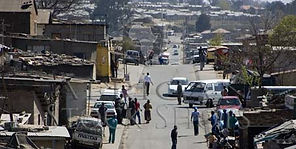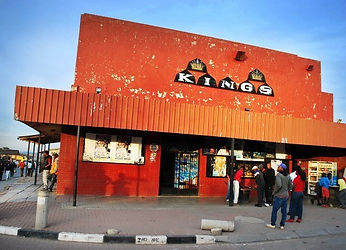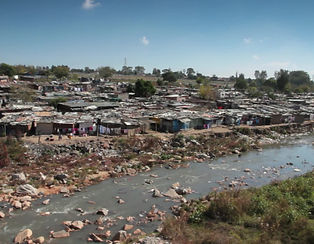
Alexandra township info/biography
Alexandra is located in Gauteng Alexandra
Location within Greater Johannesburg
Coordinates: 26°6.23′S 28°5.77′ECoordinates: 26°6.23′S 28°5.77′E
Country South Africa
Province Gauteng
Municipality City of Johannesburg
Established 1912
Area info
• Total 6.91 km2 (2.67 sq mi)
Population (2011)[1]
• Total 179,624
• Density 26,000/km2 (67,000/sq mi)
Racial makeup (2011)[1]
• Black African 99.0%
• Coloured 0.4%
• Indian/Asian 0.1%
• White 0.1%
• Other 0.4%
First languages (2011)[1]
• Zulu 26.3%
• Northern Sotho 23.1%
• Tsonga 11.3%
• Xhosa 9.8%
• Other 29.6%
Postal code (street) 2090
PO box 2014

Alexandra, informally abbreviated to Alex, is a township located in the Gauteng province of
South Africa. It forms part of the city of Johannesburg and is located near the upperclass suburb of Sandton. Alexandra is bounded by Wynberg on the west, Marlboro and Kelvin on the north, Kew, Lombardy West and Lombardy East on the south.
It is commonly known as "Gomorrah" among local residents.[3] Alexandra is one of the poorest urban areas in the country. Alexandra is situated on the banks of the Jukskei River. In addition to its original, reasonably well-built houses, it also has a large number (estimated at more than 20,000) of informal dwellings or "shacks".
History of Alexandra
Early history
Alexandra was established in 1912, on land originally owned by a farmer, a Mr Papenfus, who
tried to establish a white residential township there, naming it after his wife, Alexandra. However,
because it was (at the time) a considerable distance from the center of Johannesburg, this was
not a great success.[citation needed] Consequently, in 1912, Alexandra was proclaimed as a so-
called "native township". Because the township was proclaimed before the South African 1913
Land Act, it was one of the few urban areas in the country where black people could own land
under a freehold title.
By 1916, the population of Alexandra had grown to 30,000 people. and thus the Alexandra
Health Committee was established to manage the township. However, the Committee was not
allowed to collect local taxes, nor was the Johannesburg City Council willing to take responsibility
for an area that it claimed fell outside its jurisdiction, leading to a lack of resources and proper
management. When the National Party came into power in 1948 and started to implement its
policy of apartheid, Alexandra was put under the direct control of the then Department of Native
Affairs.





1950–2000[edit]
Local residents of 15th Ave, Alexandra
In the early 1960s, the government decided to demolish all family accommodation in Alexandra
and replace them with singlesex hostels, which led to widespread resistance and protest.[6]
However, owing to the high costs, lack of alternative housing for the persons that would have to
have been removed and the escalating opposition led by the Rev Sam Buti's Save Alexandra
Party,[7] only two hostels were actually completed, and so the scheme was cancelled in 1979.
The riots that started in Soweto in June 1976 quickly spread to other areas such as Alexandra,
where 19 people were killed. As a consequence of these riots, evictions, forced removals and
expropriation of black properties were stopped; urban blacks were no longer regarded as
temporary residents and their permanent status was recognised.
Finally, in 1982, Alexandra was given the official status of a residential area and the then
Alexandra liaison committee, led by Rev Buti, was instituted to run the township.
In 1980 a "Master Plan" for Alexandra was introduced, whose aim was to transform Alexandra
into a "Garden City" with a completely new layout.[7] However, only a small part of this plan was
actually ever implemented; the execution of the "Master Plan" was permanently stopped by the
violent "Alex Six Days" uprising in February 1986. The uprising resulted from an attack by the
security forces on a funeral in the township.[8] 40 people were killed. The Alexandra Township
Committee, led by trade unionist Moses Mayekiso, were arrested and beaten. Mayekiso was only
released following a strike by metal workers.[8] By May the council started collapsing and the
councillors resigned which saw the emergence of street committees and peoples' courts. After the
imposition of the nationwide state of emergency in June, the Defence Force moved in to keep the
peace. In its place, the government introduced the "Urban Renewal Plan" as part of its strategy
during the state of emergency. However, this plan led to considerable demolitions, disruptions and
displacement in the community as well as two treason trials involving 13 leaders of Alexandra.
This, combined with the considerable number of additional people moving into Alexandra during
this time, led to a new area called the "East Bank" being built. Because of the insufficient capacity
and difficult maintenance of the newly built infrastructure, the situation quickly deteriorated and
thus the "Urban Renewal Plan" was shelved in 1990. During the communal and political conflicts
that took place in the 1991–1992 period, many people were killed, injured or displaced. This led to
several peace initiatives, which were greatly assisted by the first fully democratic South African
elections in April 1994.


To assist in renewing and uplift the community, the Alexandra Renewal Project was launched in 2000.[2] The project has caused clashes between residents and companies, including SA Waste Holdings (Pty) Ltd, a waste disposal company based in nearby Marlboro.
Approximately 3,000 houses have been built for relocation purposes to date. In August 2006 American business students conducted a photography project with 190 of the youth of Alexandra. It resulted in a book, alexandra: our view of ekasi.[9] In June/July 2008 the grassroots photographic project Shooting Jozi [10][11] inspired by the Academy award winning documentary Born into Brothels took place in Alexandra with local community members. In May 2008 a series of xenophobic attacks that took place throughout South Africa, started in Alexandra Township, due to a large amount of foreigners (mainly Zimbabweans) living there. South Africans living in Alexandra Township said they were tired of foreigners taking their jobs.
Sports
The Vodacom League soccer (football) team Alexandra United plays there.
Notable residents of Alexandra included:
Nelson Mandela
Kgalema Petrus Motlanthe
Zanele Mbeki (wife of former President Thabo Mbeki)
Mark Mathabane (tennis player and author of the autobiography Kaffir Boy).
Samora Machel (former Mozambiquan president)
Alfred Nzo (South African Minister of Foreign Affairs 1994–1999)
Joe Modise (South African Minister of Defence 1994–1999)
Hugh Masekela (musician and trumpeter)
Wally Serote (poet)
Thami Mnyele (artist/activist)
Simon Mahlathini Nkabinde
(groaner/lead singer in Mahlathini and the Mahotella Queens, 1938–1999).
Irvin Khoza (sports administrator)[15]
Lesetja Kganyago
Paul Mashatile
Nkululeko Flabba Habedi
LTido
Nkululeko Charm Chauke








